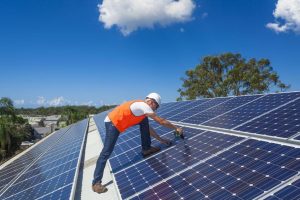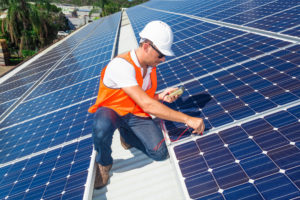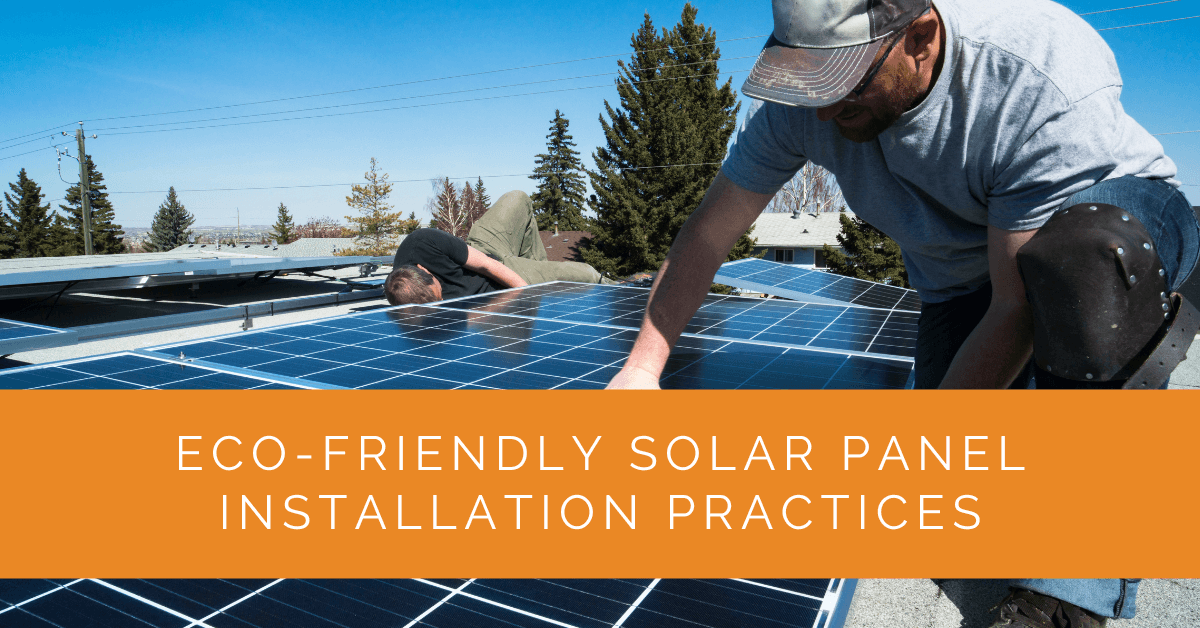Solar energy stands out as a leading renewable energy source in pursuing a sustainable future. Solar panels, also known as photovoltaic (PV) panels, harness the power of the sun to generate clean and reliable electricity. As more individuals and businesses switch to solar power, it becomes crucial to prioritize eco-friendly installation practices. This article explores the importance of sustainability in the solar power industry and delves into various low-impact and environmentally responsible techniques for solar panel installation.
Contents
- 1 Key Takeaways
- 2 Choosing Sustainable Solar Panels
- 3 Low-Impact Installation Techniques
- 4 Recycling and End-of-Life Considerations
- 5 Working with Professional Solar Installers
- 6 Case Study: Implementing Eco-Friendly Solar Panel Installation Practices
- 7 Expert Insights From Our Solar Panel Installers About Eco-Friendly Solar Panel Installation Practices
- 8 Experience Solar Excellence with Us!
- 9 Conclusion
Key Takeaways
- Embracing sustainable solar panel installation practices is crucial for promoting a greener, more eco-friendly future.
- Choosing high-quality solar panels from responsible manufacturers enhances the overall sustainability of solar power systems.
- Low-impact installation techniques, proper recycling, and working with certified solar installers all contribute to a more environmentally conscious approach to solar energy adoption.
Choosing Sustainable Solar Panels
Opting for High-Quality PV Panels
Selecting high-quality solar panels is a fundamental step toward an eco-friendly installation. High-quality panels efficiently convert sunlight into electricity and are durable, ensuring a long lifespan of clean energy production. Investing in top-tier solar panels significantly contributes to the overall sustainability of the solar power system.
When choosing solar panels, consider efficiency, material quality, and manufacturer reputation. While high-quality panels may involve a slightly higher upfront cost, their superior performance and longevity make them a worthwhile and environmentally conscious investment.
Prioritizing Local and Responsible Manufacturers
Sustainability goes beyond the performance of solar panels. It also involves the entire supply chain and manufacturing process. Opting for solar panels from local and responsible manufacturers offers several benefits in terms of sustainability.
Supporting local manufacturers reduces the carbon footprint of transporting panels over long distances. Additionally, local manufacturers are more likely to adhere to stringent environmental regulations, ensuring responsible and eco-friendly manufacturing practices. By choosing solar panels from ethical and sustainable sources, individuals and businesses can positively impact the environment while contributing to the growth of local economies.

Low-Impact Installation Techniques
Site Assessment and Design
A thorough site assessment and thoughtful design are essential for low-impact solar panel installations. Solar installers analyze various factors during the planning phase, including the site’s sun exposure, shading, and existing infrastructure. The goal is to maximize solar energy yield while minimizing negative environmental impact.
Installers can optimize energy capture by strategically placing solar panels and considering the existing landscape without disrupting the natural surroundings. This low-impact approach ensures that solar installations seamlessly integrate into the environment while harnessing the maximum solar potential.
Rooftop Solar Installations
Rooftop solar installations are a popular choice for residential and commercial spaces. Utilizing existing rooftops for solar panels minimizes the need for additional land use, making it a sustainable and efficient option. With careful planning and design, solar panels can be seamlessly integrated into rooftops without compromising their structural integrity.
Rooftop solar installations also offer the advantage of utilizing previously unused space. This repurposing of rooftops adds value to the property and contributes to a cleaner and greener energy solution for the building.
Ground-Mounted Solar Arrays
For larger-scale installations, ground-mounted solar arrays provide an opportunity for sustainable land use. Unlike rooftop installations, ground-mounted arrays require designated space, but they offer greater flexibility regarding solar panel orientation and tilt angles.
Solar installers consider the environmental impact when selecting ground-mounted locations to ensure an eco-friendly approach. Avoiding ecologically sensitive areas and working with local authorities to assess land use permits are essential steps in responsible ground-mounted solar installations. Proper site selection and design contribute to a harmonious coexistence between solar energy generation and the surrounding environment.
Tracking and Tilt Systems
Enhancing energy efficiency is a key aspect of eco-friendly solar panel installations. Tracking systems and tilt mechanisms are advanced technologies that optimize energy capture by adjusting the orientation of solar panels.
Tracking systems allow solar panels to follow the sun’s path throughout the day, ensuring optimal sun exposure and maximizing energy generation. This technology is particularly beneficial in regions with varying sunlight angles.
Similarly, tilt systems enable solar panels to adjust their tilt angle according to the sun’s position, further enhancing energy capture. By incorporating tracking and tilt systems, solar installations become more efficient and effective in harnessing solar energy, reducing the overall environmental impact.

Recycling and End-of-Life Considerations
Proper Recycling of Solar Panels
Responsible recycling practices are essential to ensure the sustainability of solar panel installations. While solar panels have a long lifespan, they eventually reach the end of their useful life, typically after around 25 to 30 years. At this stage, recycling old solar panels properly becomes crucial to avoid e-waste concerns.
Solar panel recycling involves separating and recovering valuable materials, such as glass, silicon, and metals. These materials can be repurposed for manufacturing new solar panels or other products, reducing the demand for virgin raw materials. By embracing proper recycling practices, the solar industry contributes to a circular economy and minimizes environmental impact.
Extending Solar Panel Lifespan
To enhance sustainability, solar panel owners should focus on extending the lifespan of their solar installations. Regular maintenance and care ensure solar panels operate optimally, maximizing energy production efficiency.
Working with professional solar installers for regular inspections and maintenance can identify and address potential issues early on. Routine cleaning and inspection of solar panels help keep them in peak condition, ensuring consistent energy generation throughout their lifespan.
Investing in high-quality solar panels from reputable manufacturers contributes to their longevity. Durability and resilience against environmental factors are essential features that prolong the life of solar panels, making them an environmentally responsible choice.
Working with Professional Solar Installers
Selecting Certified Solar Installers
Collaborating with professional solar installers with relevant certifications and qualifications is critical for eco-friendly solar panel installations. Certified installers are well-versed in sustainable installation practices and adhere to industry standards.
Solar installers with certifications from reputable organizations, such as the North American Board of Certified Energy Practitioners (NABCEP), demonstrate their expertise and commitment to quality installations. Partnering with certified installers ensures that solar panel installations are executed with precision, efficiency, and environmental consciousness.
Project Management and Best Practices
Professional solar installers excel in installation expertise and demonstrate effective project management and best practices. Skilled solar installers prioritize low-impact techniques and sustainable approaches from initial site assessment to final installation.
Efficient project management ensures that the installation process is streamlined, reducing environmental disruptions. Proper waste management and adherence to environmental regulations further contribute to eco-friendly solar panel installations.
Case Study: Implementing Eco-Friendly Solar Panel Installation Practices
Background
At Solar Panels Network USA, we believe that transitioning to renewable energy should go hand-in-hand with sustainable installation practices. Our commitment to eco-friendly solutions led us to undertake a residential solar installation project that exemplified our dedication to sustainability and high performance.
Project Overview
The project involved installing a 10 kW solar PV system on a residential property in an environmentally sensitive area. The homeowner was keen on reducing their carbon footprint while ensuring that the installation process would not adversely affect the surrounding ecosystem.
Initial Site Assessment
Comprehensive Analysis
Our team began with a thorough site assessment, evaluating the property’s sun exposure, shading patterns, and existing infrastructure. Using advanced software and tools, we mapped out the optimal placement for the solar panels to maximize energy capture without disturbing the natural surroundings.
Environmental Considerations
Given the proximity to a protected natural reserve, we were particularly mindful of minimizing any potential ecological disruption. We consulted with local environmental authorities to ensure compliance with all regulations and to address any concerns about habitat impact.
Implementation
Selecting High-Quality Panels
We selected high-efficiency solar panels from a local manufacturer known for their responsible production practices. This choice not only ensured excellent performance but also reduced the carbon footprint associated with transportation.
Low-Impact Installation Techniques
- Rooftop Integration: To preserve the landscape, we opted for a rooftop installation. This approach eliminated the need for additional land use and seamlessly integrated the solar panels into the home’s existing structure. We used non-invasive mounting techniques to avoid damaging the roof, ensuring the system’s stability and durability.
- Ground-Mounted Arrays: For the additional power requirement, we installed a small ground-mounted array in an area previously designated as a garden. By carefully planning the layout and using adjustable tilt mechanisms, we maximized sunlight capture while maintaining the aesthetic and ecological integrity of the garden space.
Recycling and End-of-Life Considerations
Sustainable Materials
We used stainless steel fasteners and corrosion-resistant materials to enhance the system’s longevity. These choices not only ensure durability but also facilitate easier recycling at the end of the panels’ lifecycle.
Recycling Plan
We developed a comprehensive recycling plan for the homeowner, outlining steps for proper disposal and recycling of solar panels and components once they reach the end of their useful life. This plan includes partnerships with local recycling facilities capable of processing solar panel materials.
Results
Environmental Benefits
The installation was completed with minimal environmental impact. The rooftop panels provided efficient energy production without altering the property’s landscape. The ground-mounted array complemented the home’s energy needs while preserving the garden’s aesthetics and biodiversity.
Energy and Cost Savings
Post-installation, the homeowner reported a significant reduction in energy bills, achieving near energy independence. The high-quality panels and optimal installation ensured maximum efficiency, translating to considerable cost savings over time.
Community Impact
The project served as a model for eco-friendly solar installations in the community. Neighbors and local businesses took interest in the sustainable practices employed, leading to increased awareness and adoption of green energy solutions in the area.
Summary
This project highlights the successful integration of eco-friendly practices in solar panel installation. By choosing high-quality, responsibly manufactured panels, employing low-impact installation techniques, and ensuring proper recycling measures, Solar Panels Network USA demonstrated a comprehensive approach to sustainability. The project not only provided significant energy and cost savings for the homeowner but also set a benchmark for environmentally responsible solar installations. As we continue to innovate and promote green energy solutions, our commitment to eco-friendly practices remains steadfast, driving a cleaner and more sustainable future.
Expert Insights From Our Solar Panel Installers About Eco-Friendly Solar Panel Installation Practices
Choosing high-quality solar panels is not just about efficiency; it’s about longevity and sustainability. Investing in top-tier panels ensures that you get the most out of your system while minimizing environmental impact over the long term.
Senior Solar Installation Engineer
Low-impact installation techniques are crucial. By conducting thorough site assessments and integrating panels into existing structures like rooftops, we can harness solar power without disrupting the natural landscape.
Eco-Friendly Solar Solutions Specialist
Working with certified solar installers guarantees that your installation adheres to the highest environmental and quality standards. Our goal is to deliver a system that performs efficiently and aligns with sustainable practices.
Certified Solar Installer
Experience Solar Excellence with Us!
Trust in Solar Panels Network USA, where our seasoned experts deliver top-quality solar solutions for homes and businesses nationwide. With a legacy of countless successful installations and a commitment to sustainable energy, we’re your reliable partner in the solar journey. Ready for a brighter, eco-friendly future? Call us now at (855) 427-0058 and harness the power of the sun!
Conclusion
In the journey towards a greener and more sustainable future, eco-friendly solar panel installation practices play a pivotal role. By choosing high-quality solar panels, prioritizing sustainability in site assessment and design, embracing responsible recycling, and working with certified installers, individuals and businesses can significantly impact the environment. As a clean and renewable energy source, solar energy offers a promising alternative to fossil fuels, reducing carbon emissions and promoting a more sustainable energy future. Embrace eco-friendly solar panel installations and be a part of the clean energy revolution that will shape a cleaner, greener, and more sustainable world for generations to come.
About the Author
Solar Panels Network USA stands at the forefront of solar energy solutions, driven by a team of seasoned solar engineers and energy consultants. With over decades of experience in delivering high-quality solar installations and maintenance, we are committed to promoting sustainable energy through customer-centric, tailored solutions. Our articles reflect this commitment, crafted collaboratively by experts to provide accurate, up-to-date insights into solar technology, ensuring our readers are well-informed and empowered in their solar energy decisions.

